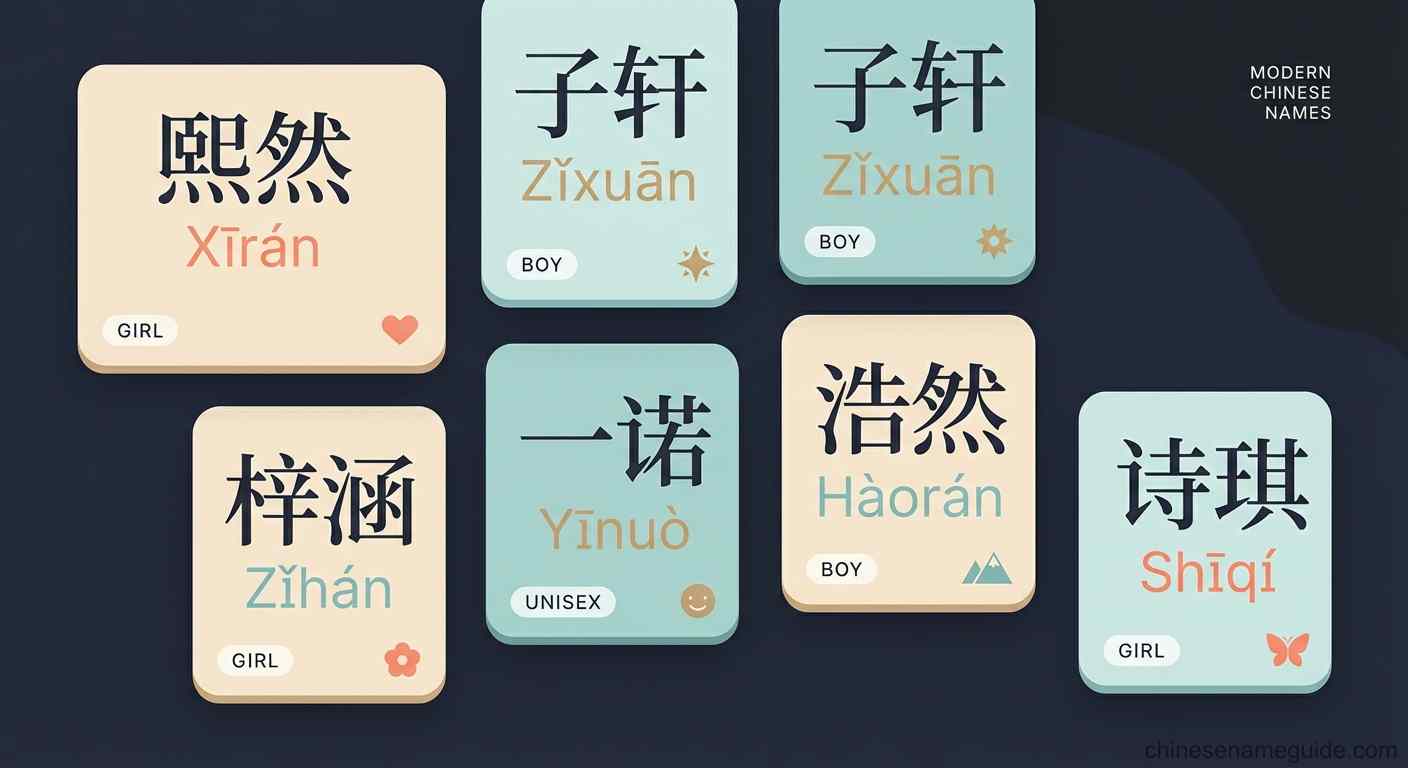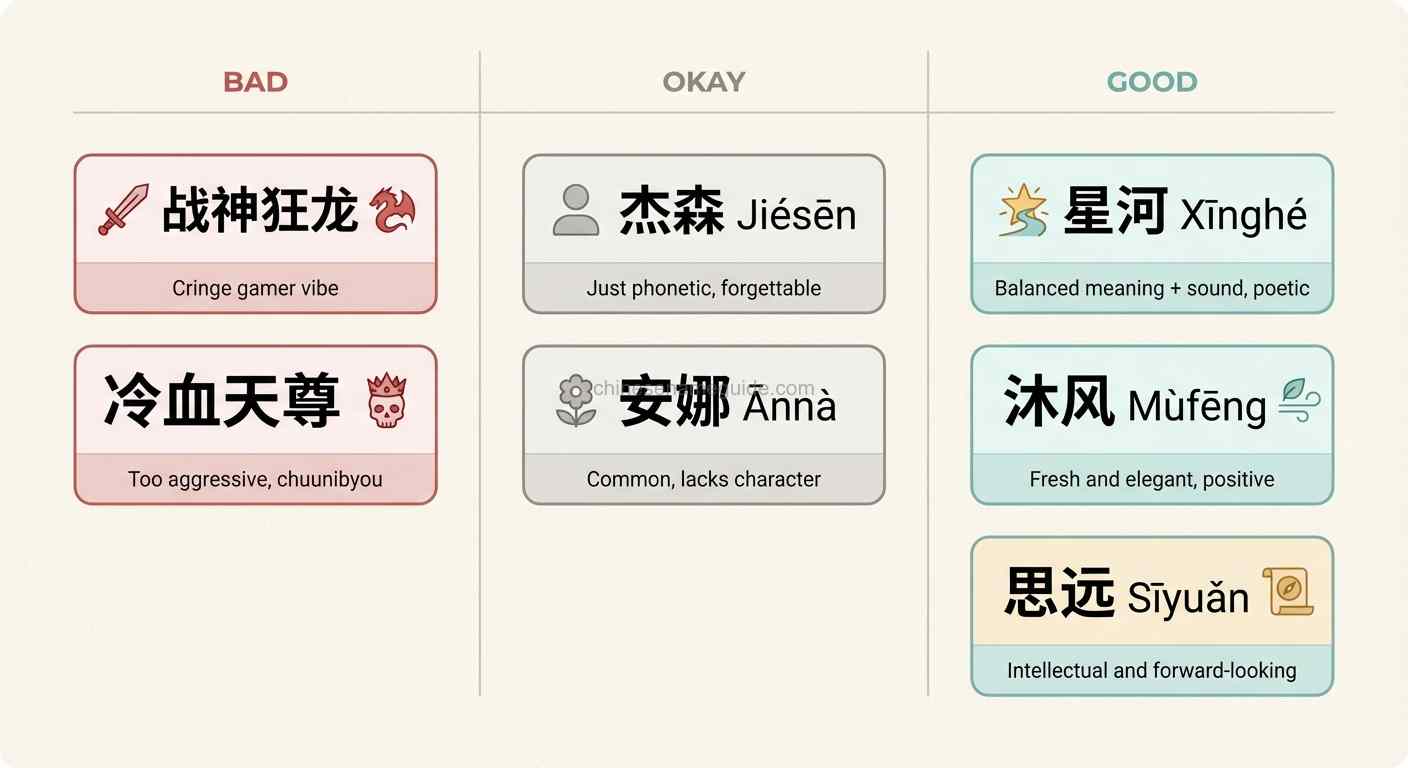
Modern Trends in Chinese Baby Naming
How contemporary Chinese parents are balancing traditional cultural values with modern preferences when naming their children.
How contemporary Chinese parents blend tradition with 21-century taste when choosing a child’s name
“We wanted a name that nods to my grandfather’s generation but still feels 2020-something.” — Shanghai father interviewed by South China Morning Post
Each year China registers roughly 9–11 million newborns.
In 2000, more than 80 % of those babies received one of the 100 most common given names; by 2025 that share has fallen below 55 % (Ministry of Public Security).
Parents are clearly rewriting the playbook. Below we dissect the data, cultural logic and emerging technology behind the shift.
Measuring the shift
| Indicator | 2000 | 2020 | 2024 ▲ | Source |
|---|---|---|---|---|
| Babies whose given name appears only once in that year’s registry | 13 % | 31 % | 37 % | F1000Research study on 13 M records |
| Babies registered with the maternal surname | 1.3 % | 5.5 % | 7.7 % | National registry & China Daily feature |
| Names containing emoji-style radicals such as 澜 or 炫 | n/a | 0.6 % | 2.1 % | National Citizen-ID Bureau extract 2024 |
Traditional anchors parents still care about
| Cultural anchor | Contemporary expression |
|---|---|
| Generational character (zibei) | 64 % of families in Hunan & Jiangxi (2023 survey) still insert the prescribed generation character, then add an innovative second character. |
| Five-Elements & Fortune check | 70 % of high-income parents in Shenzhen purchased a paid “name audit” before registration (iResearch 2024). |
| Classical literature sourcing | Shijing, Chu Ci and Tang-Song poetry remain the top three reservoirs; Bilibili hosts > 18 k videos titled “楚辞起名”. |
Even parents who pick a short, gender-neutral name like Yi-Chen (逸宸) typically run a Five-Elements compatibility check first.
Modern forces reshaping decisions
a. Need-for-Uniqueness (NFU)
Bao & Hu (2023) show that the Shannon entropy of given names tripled from the 1980 to 2010 birth cohorts—a statistical proxy for uniqueness.
b. Gender parity in surnames
A 2024 Shanghai survey found 62 % of millennial couples at least discuss giving the first child the mother’s surname; 18 % adopt a compromise (second child or double surname).
c. Pop culture & social media
The sci-fi hit The Three-Body Problem boosted registrations of “程心”; viral C-pop lyrics push characters like 栖 and 澈 into top-200 lists. Weibo tag #网红取名 exceeds one billion reads.
d. AI co-creation
WeChat mini-apps and GPT-powered tools now generate hundreds of legally compliant names in seconds. A Hong Kong father who delegated baby naming to ChatGPT drew 12 million views in 24 hours.
A blended decision workflow
| Step | Traditional practice | Modern layer |
|---|---|---|
| 1. Choose surname(s) | Clan elders consult genealogy | Online forums debate double-surname legality |
| 2. Fix generation character & fortune | Paper lineage book; fortune-telling | Mobile app calculates ba-zi and suggests auspicious radicals |
| 3. Select candidate characters | Kangxi dictionary, poetry anthologies | Excel rank by frequency, AI filter for phonetic clashes |
| 4. Crowd-test | Family WeChat poll | XiaoHongShu A/B post |
| 5. Final registration | Manual form at registry office | One-click OCR form on Alipay portal |
The tension point is step 3: parents may shortlist 30 “good-looking” characters, then rely on AI to deduplicate, check tone harmony and flag undesired homophones—finally submitting the survivors to older relatives for blessing.
Conclusion
Modern Chinese baby names sit at the intersection of heritage, individualism and technology. Clan traditions—generation characters, fortune checks, classical quotations—still anchor the process, but parents now demand uniqueness, gender parity and AI-level convenience.
For product builders
- Offer lineage-aware features (generation-character matcher) to reassure grandparents.
- Bundle fortune analysis with AI suggestions to save time.
- Provide international filters (Pinyin collision, domain availability) for Gen-Z parents.
Names in China have always narrated social change; today they are co-authored by Confucius, fandom culture and GPT.
Compiled July 2025. Dataset and interview transcripts available on request — research@chinesenameguide.com.
Related Articles

How to Pronounce Chinese Names with Pinyin: A Practical Guide for Non-Native Speakers
A practical guide to pronouncing Chinese names written in pinyin, covering name structure, pinyin basics, common patterns, and practice tips for non-native speakers.

Modern Chinese Names: What Kids Are Actually Called Now
Forget Li Ming and Wang Wei. A ground-level look at what Chinese kids are really named today, what those names signal, and how to sound modern without sounding ridiculous.

Why Most Chinese Name Generators Are Dangerous (Don't Get a Tattoo Yet!)
Before you tattoo a ‘cool Chinese name’ or launch a brand with it, read this. A brutally honest look at how most Chinese name generators actually work — and why they can quietly ruin your skin, your brand, or your reputation.